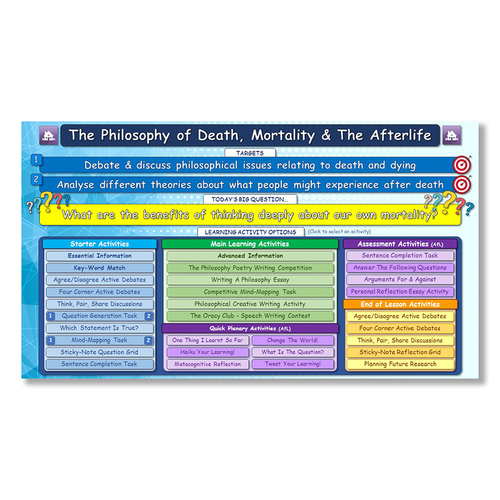

















Philosophers and sages have reflected on the nature and significance of death and mortality since ancient times whilst reflecting on the possibility of an afterlife in the face of the mystery of death. According to many philosophers and psychologists: a healthy appreciation of one’s own finitude is essential for living a full life and for striving to live without regrets.
Speaking about death and dying is a taboo in our society and yet by failing to speak openly about it we can often exacerbate the fear of death in young minds and feed their anxieties around death. This interactive philosophy lesson allows for open and reasonable discussions about death, mortality, and the possibility (or impossibility) of an afterlife. It is created without a religious or cultural bias or an agenda to persuade or convert students to a particular viewpoint in relation to the afterlife.
This session is ideal for teachers who want to explore these deep matters of life and death with students aged 8-16; we’ve carefully selected the most significant issues and questions relating to death and the afterlife so that young learners can engage in fun philosophical discussions and debates. This session explores topics such as:
- The nature of the death
- The benefits of contemplating one’s own mortality
- Different views about the afterlife
- Whether or believing in ghosts is justified
- The value of funerals and honouring the dead
- Existential psychology
Please be careful to time your use of this resource carefully and to deliver it with due sensitivity as some young people might struggle to wrestle with these issues. Please note: this resource discusses a variety of afterlife beliefs (i.e. the possibility of reincarnation, Heaven, Hell and nothingness) and, therefore, will probably involve the analysis and evaluation of religious beliefs.
The big question asked in this session is “What are the benefits of thinking deeply about our own mortality?”. Using a variety of engaging activities students will discuss and debate a wide range of other philosophical questions such as:
- Why do you think people are reluctant to talk about death and dying and that such topics are a taboo in our society?
- To what extent can thinking about death help us to appreciate and value those around us more?
- Many people have reported seeing ghosts: to what extent does this prove that ghosts exist?
- What do you think people experience after they die?
- How should we live our lives in such a way that we are always ready to die? and
- To what extent do Near Death Experiences (NDEs) prove that life after death is definitely true?
Something went wrong, please try again later.
This resource hasn't been reviewed yet
To ensure quality for our reviews, only customers who have purchased this resource can review it
Report this resourceto let us know if it violates our terms and conditions.
Our customer service team will review your report and will be in touch.